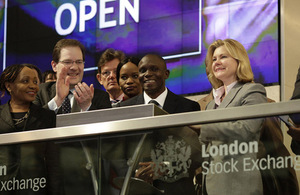UK WILL FOCUS ON FRONTIER ECONOMIC DEVELOPMENT : JUSTINE GREENING
Britain to increase investment in emerging economies and partner with leading companies to improve business conditions in Africa and South Asia.
Britain will more than double its investment in growing emerging frontier economies to end their dependency on aid, International Development Secretary Justine Greening has announced.
The UK government will also agree a series of new partnerships with leading British and international companies to improve business conditions in Africa and South Asia, kick-start embryonic capital markets and drive more investment into frontier economies.
In a keynote speech at the London Stock Exchange this morning, Justine Greening set out the Department for International Development’s new approach to support growth and create jobs in developing countries.
She also met the first delegation of East African businessmen, civil servants and regulators to be trained in managing capital markets through the DFID-backed London Stock Exchange Group Academy.
Justine Greening said:
Economic development is, without question, the only way countries can leave behind enduring and chronic poverty for good.
I have restructured my department to focus on jobs and growth and can now commit to more than double the amount we will invest in this crucial area.
Working with world-class businesses ensures frontier developing economies get the best support, advice and expertise they need to grow and Britain is well placed to benefit from this growth.
DFID’s new approach, outlined today in Justine Greening’s speech, means DFID will:
-
More than double aid spending on economic development.
In 2015/16 DFID will plan to target £1.8 billion of its budget on economic development, more than doubling the amount spent in 2012/13. This is on top of indirect funding through core contributions to multilateral organisations
-
Partner with 12 UK high street names to improve working conditions and job opportunities for more than 700,000 workers and smallholder farmers in Kenya, South Africa and Bangladesh.
This will include working with Sainsbury’s to help workers gain qualifications; Marks and Spencer to develop leadership and management skills for farm workers; Debenhams, Primark, Asda, River Island, John Lewis Partnership, C&A, M&Co, Next and Morrisons to improve management in Bangladeshi garment factories; and Tesco and Asda to invest in young fruit farm workers from disadvantaged backgrounds in South Africa.
-
De-risk business investment in frontier economies by backing investment insurance in frontier economies including Burma, Sierra Leone, Zimbabwe and Nepal.
A lack of adequate and affordable insurance prevents promising business investment in fragile states. A £20 million investment in the Multilateral Investment Guarantee Agency will enable it to support up to £270 million of new private investment in fragile countries.
-
Appoint Novastar, a venture capital fund based in East Africa, as the first beneficiary of a CDC-managed fund that will provide capital to promising businesses which benefit the community.
The fund will invest up to £9 million in Novastar to allow it to support more entrepreneurs and businesses and in East Africa which provide low-cost schooling, healthcare, energy, housing and safe water.
-
Sign the UK’s first Memorandum of Cooperation with the London Stock Exchange Group to support emerging capital markets in Africa.
This will allow the LSEG Academy to expand its training in Tanzania and, in time, across East Africa
NEWS

London International Training
Centre
Claim House 27 Aintree
Road Perivale London,
Middlesex UB6 7LA
United Kingdom
Tel: +44(0) 20 8998 8866
Fax: +44 (0)20 8998 8869
E-mail: info@londonitc.org.uk
Website: www.londonitc.org.uk





